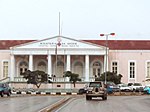2003 Angola Boeing 727 disappearance
2000s missing person cases2003 in AngolaAccidents and incidents involving the Boeing 727Aviation accidents and incidents in 2003Aviation accidents and incidents in Angola ... and 4 more
May 2003 crimesMay 2003 events in AfricaMissing aircraftUnsolved crimes in Angola

On 25 May 2003, a Boeing 727-223 airliner, registered N844AA, was stolen at Quatro de Fevereiro Airport in Luanda, Angola, prompting a worldwide search by law enforcement intelligence agencies in the United States. No trace of the aircraft has been found.
Excerpt from the Wikipedia article 2003 Angola Boeing 727 disappearance (License: CC BY-SA 3.0, Authors, Images).2003 Angola Boeing 727 disappearance
Rua da Pracinha, Luanda Kilamba Kiaxe
Geographical coordinates (GPS) Address Nearby Places Show on map
Geographical coordinates (GPS)
| Latitude | Longitude |
|---|---|
| N -8.8583333333333 ° | E 13.231111111111 ° |
Address
Aeroporto Internacional 4 de Fevereiro (Aeroporto Internacional Quarto de Fevereiro)
Rua da Pracinha
Luanda, Kilamba Kiaxe
Luanda Province, Angola
Open on Google Maps





